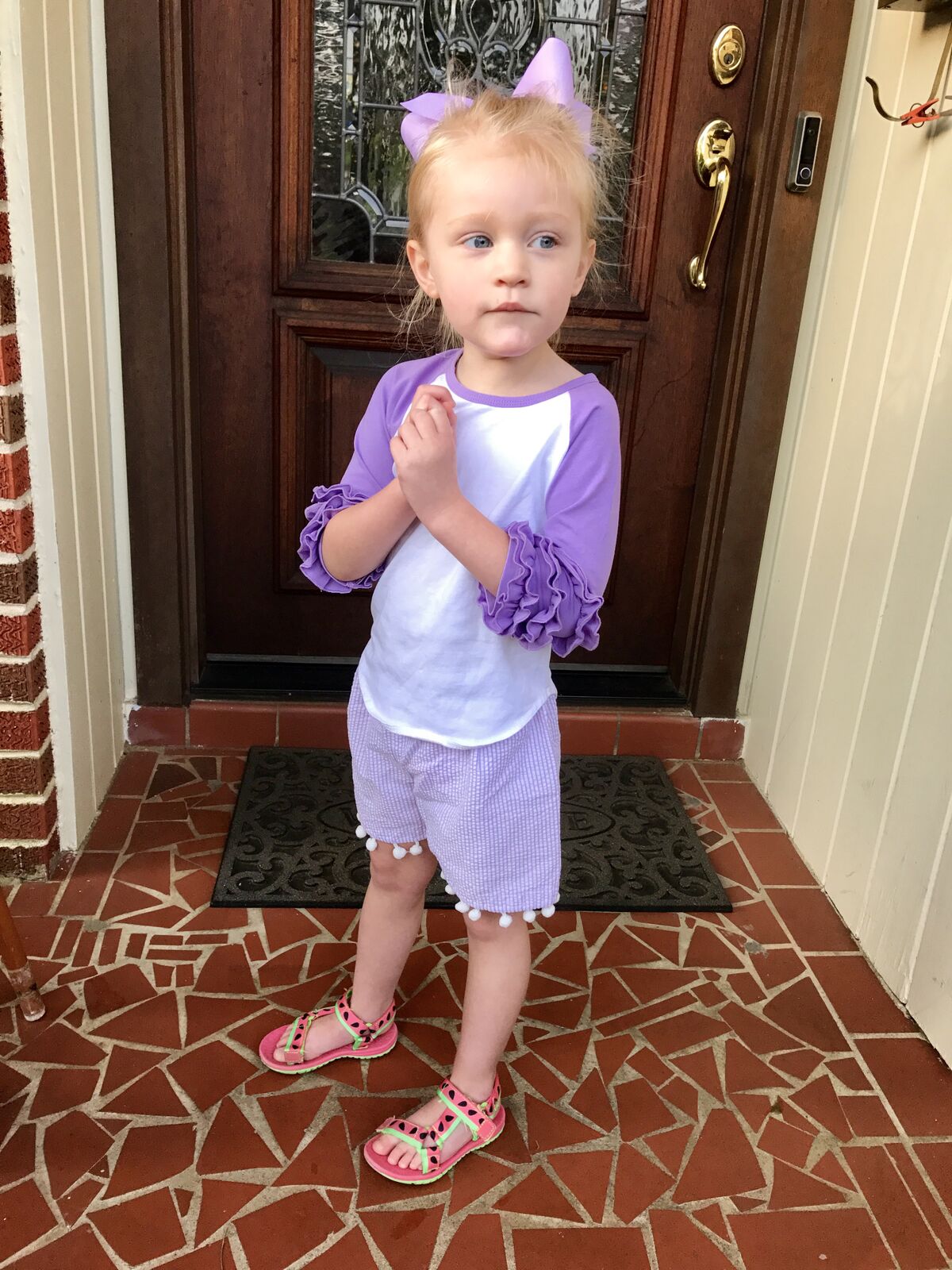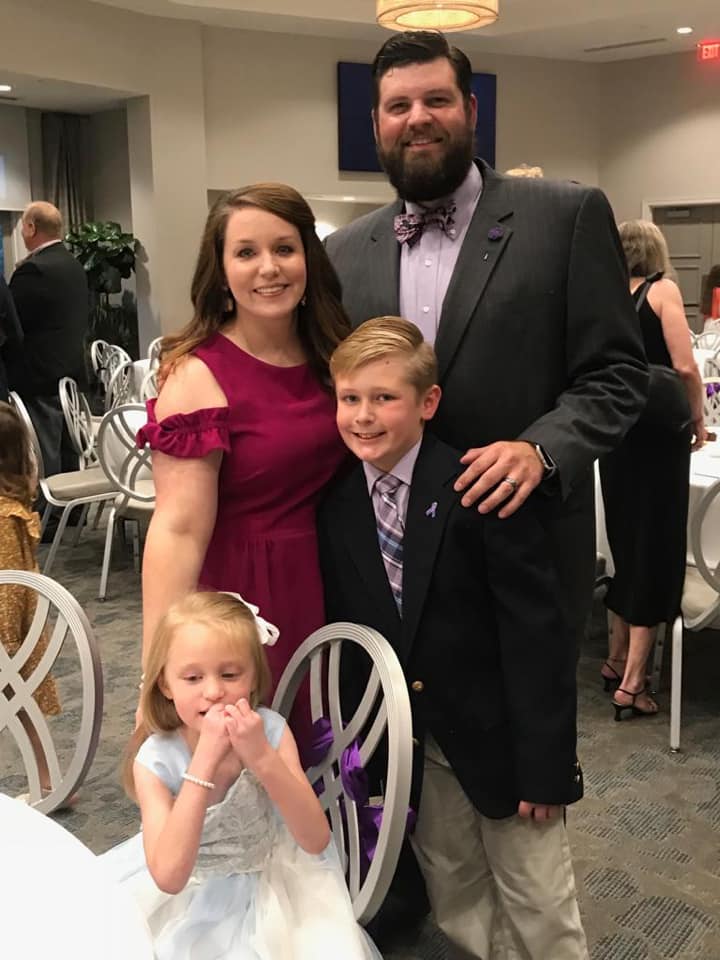“In the beginning, Violet could say a few words. She would say momma, dadda and bubba,” said Mandy Monson, Violet’s mother. “She didn’t suddenly forget who we were. She just stopped being able to communicate it.”

Violet Monson
Violet, a toddler from Montgomery, Ala., was a quiet little mystery to her doctors. It would be almost two years until “D-Day,” or Diagnosis Day would finally come for the Monson family and their precious Violet.
Early intervention
Violet started showing signs of regression when she was around eight months old. Her parents, Matt and Mandy Monson, noticed she was no longer able to sit up on her own. She also wasn’t making any effort to crawl.
“If you sat her up, she would sit there all day long,” said Mandy. “She wouldn’t fall over, but she was really not doing anything to get herself into that position.”
During Violet’s nine-month checkup, Mandy voiced her concerns to the pediatrician, who then decided to examine Violet’s reflexes. After a few tests, the pediatrician recommended Alabama’s Early Intervention System, which helps infants and toddlers with disabilities or delays learn key development skills.
The Monsons met with a physical therapist who, after working with Violet for about 30 minutes, found she had severely low muscle tone.
“That just raised more questions,” said Mandy. “I asked what would cause that, and she said, ‘Well, a lot of things. It could be totally benign, it could just be something that’s happened on its own, or could be something bigger.’”
Their search for answers continued with therapy, and lots of it.
“She was doing physical therapy three times a week and then we added occupational therapy,” Matt, Violet’s father, explained. “When she was around 13 or 14 months old, she started to speak some words. She would say things like momma, dadda, bubba and ball.”
Although Violet had a few milestones and “breakthrough words,” Matt and Mandy knew there was still a larger issue at hand and they were determined to figure it out. Violet’s pediatrician referred her to a neurologist at Children’s of Alabama in Birmingham for more testing to at least rule out some possible causes.
The waiting game
The Monsons had an appointment on the books but due to the high volume of patients, the earliest available date was six months later.
After six months, Violet’s appointment was finally here, and the waiting game was over. At least, that’s what they thought when they walked into the specialist’s office.
 Based on her medical history, the neurologist suspected Violet had Prader-Willi syndrome, a genetic condition characterized by weak muscle tone, feeding difficulties, poor growth and delayed development. The full results would take 12 weeks to come back.
Based on her medical history, the neurologist suspected Violet had Prader-Willi syndrome, a genetic condition characterized by weak muscle tone, feeding difficulties, poor growth and delayed development. The full results would take 12 weeks to come back.
Three months later, the test came back…negative. In the meantime, Violet began to regress yet again.
“She quit speaking completely,” said Mandy. “Leading up to that appointment, I realized all of her words were gone.”
The neurologist was stumped, but she was determined to help find a diagnosis for Violet. She recommended the Clinical Sequencing and Exploratory Research (CSER) project at HudsonAlpha, a National Institutes of Health (NIH) funded effort that works to diagnose children with unexplained developmental delays through the use of genomic sequencing.
“She said we should pursue whole genome sequencing and could do so through HudsonAlpha. It’s no cost, without insurance and it’s part of a study called CSER,” Mandy explained.
There was one problem. Violet had to be at least two years old to enroll, but she was still only one at the time. They called anyway and made an appointment for November 23, the day after Violet’s 2nd birthday.
On November 23, the Monsons arrived at North Alabama Children’s Specialist (NACS) in Huntsville bright and early for their appointment, before the doors were even open.
Health and family history was documented, blood was drawn and then sent over to HudsonAlpha. And at that point, there was only one thing left to do. Wait.
“We got a call in about four months,” said Mandy. “They said our results were ready but we’d have to make an appointment and come in person. The soonest we could get an appointment was three weeks from then, so more waiting.”
“D-Day”
Crossing off the calendar days became more difficult for Matt and Mandy, because they knew – whether good or bad, there was an answer for their daughter and only time kept them from it.
Three weeks later on May 12, 2016, “D-Day” — Diagnosis Day — finally arrived for the Monson family. After two and a half years of searching and waiting, Violet was diagnosed with Rett syndrome. The news brought on mixed feelings of relief and devastation.

Violet (with her mom, dad and brother Josiah) was honored at the Rockin’ for Rett dinner in September along with others diagnosed with Rett syndrome by HudsonAlpha
“I was so outside of myself and just in utter shock,” Mandy explained. “I brought home a healthy and strong baby girl, and then it was like this invisible monster had stolen her away from me and robbed her of a childhood.”
“We had to go through all the stages of grief,” said Matt. “We had to grieve for the life that we dreamed of for her and come to accept the life that she has and make the very best of that.”
Rett syndrome is a rare neurodevelopmental disorder affecting 1 in 10,000 girls across the globe. Children with Rett syndrome have normal early growth and development, then begin to regress between 6 and 18 months of age.
Mandy admits, “It was a lot to take in, but we gave ourselves one day to cry, scream, and stomp our feet if we need to, but tomorrow, we get up and fight because Rett has messed with the wrong family.”
Matt and Mandy said having a name for Violet’s condition was an important first step and has opened a number of doors.
“There’s power in that,” said Matt. “Now we’re connected with not only local families but those from around the world who have a child with Rett syndrome. It’s nice to know we’re not alone.”
With a diagnosis in hand, they were able to connect with the world’s top Rett syndrome specialist, located only a few miles away in Birmingham, Ala., and also look into clinical trials for Violet.
“When we make a clinical diagnosis, it can sometimes lead to tremendous benefits for the family,” said Greg Cooper, PhD, faculty investigator at HudsonAlpha who led the CSER project. “Having that knowledge about what’s happening allows them to have a better sense of what to expect in the future, a chance to connect to other families going through a similar experience, and possibly the ability to get better treatment options.”
“Just having a name meant so much to us,” said Mandy. “I still think she would be undiagnosed if it wasn’t for HudsonAlpha.”
If you, or someone you know has symptoms that may be due to an undiagnosed genetic disorder, contact North Alabama Children’s Specialists at 256-533-0833 ext. 216 to learn more about ongoing genome sequencing research studies.
The CSER project was funded through NIH grant UM1HG007301.


